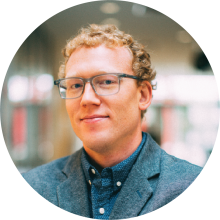CBE Seminar (ZOOM): Mapping the Ligand Binding Landscape

Department of Biochemistry and Molecular Biology
Department of Computational Mathematics, Science and Engineering
Michigan State University, East Lansing, Michigan
Abstract: The interaction between a small molecule ligand and a protein involves many conformational states. To bind, a ligand must search across a rough free energy landscape that contains many metastable minima. A map of this “ligand binding landscape” could be useful during drug design, as it contains a set of possible binding modes that could be stabilized by modifications of the chemical groups of the ligand. These maps also include information about the connectivity of these poses, both with each other and with the unbound state, which can provide insight into ligand binding kinetics, a useful parameter for drug design. Unfortunately, creating maps of the ligand binding landscape is a great challenge, as binding and release events typically occur on timescales that are beyond the reach of molecular simulation. Our lab has developed simulation methodologies (e.g. WExplore, REVO) that can broadly and efficiently explore free-energy landscapes and are capable of simulating ligand release pathways that occur on timescales as long as minutes. Importantly, these methods employ only unbiased trajectory segments, allowing for the construction of Markov state models (MSM) and conformation space networks that combine the results of multiple simulations. In this talk I will describe the how these simulation methods work and how they are implemented, and survey some recent applications from our group to investigate long timescale protein-ligand interactions.
Bio: Dickson is an assistant professor in the Department of Biochemistry and Molecular Biology at Michigan State University, with a dual appointment in the Department of Computational Mathematics, Science and Engineering. His research group specializes in the development of algorithms for improving the sampling capabilities of molecular dynamics simulations. Dickson received his Ph.D. in chemistry from the University of Chicago and worked as a postdoctoral researcher in the group of Charles L. Brooks III at the University of Michigan. His research is funded by an R01 award from the National Institutes of Health, as well as grants from the National Science Foundation and the Human Frontiers Science Program. In 2019, Dickson was awarded the OpenEye Outstanding Junior Faculty Award from the American Chemical Society.
Share
Upcoming Events
-
CBE 298 Seminar: Teaching Transport Phenomena Through Observation - From Einstein’s Tea Leaves to Dissolving Skittles
-
MSE 298 Seminar: Basic Materials Science Aspects In Sustainable Metallurgy
-
EECS Seminar: Terahertz Metasurface Quantum-Cascade Vertical-External-Cavity Surface-Emitting-Lasers (VECSELs)
-
2026 Annual Design Review
-
MSE 298 Seminar: Identification and Engineering of Interlayer Stacking Configurations in van der Waals Crystals
